When it comes to health care technology investments next year, health systems are more likely to invest in proven solutions that will have an immediate impact. For instance, nine out of 10 health systems say they will boost spending on cybersecurity technology that will help identify threats in 2018, but they are proceeding more cautiously on widely hyped artificial intelligence technologies and consumer-focused devices such as wearables.
Those are among the findings of a new survey covering more than 20 major U.S. health systems and conducted by the Pittsburgh-based Center for Connected Medicine (CCM), in partnership with the Health Management Academy (The Academy).
Titled “Top of Mind for Top U.S. Health Systems 2018,” the report provides insights into how health care leaders are prioritizing emerging health IT trends in the coming year. Based on quantitative and qualitative surveys of executives at leading hospitals and health systems across the country, the report focuses on the five areas in the health IT industry, namely cybersecurity, consumer-facing technology, predictive analytics, virtual care and artificial intelligence.
Highlights from the Top of Mind 2018 report include:
- CYBERSECURITY: 92 percent of respondents plan to increase spending on technology to boost cybersecurity in 2018. Two-thirds of respondents said they are increasing non-C suite cybersecurity staff.
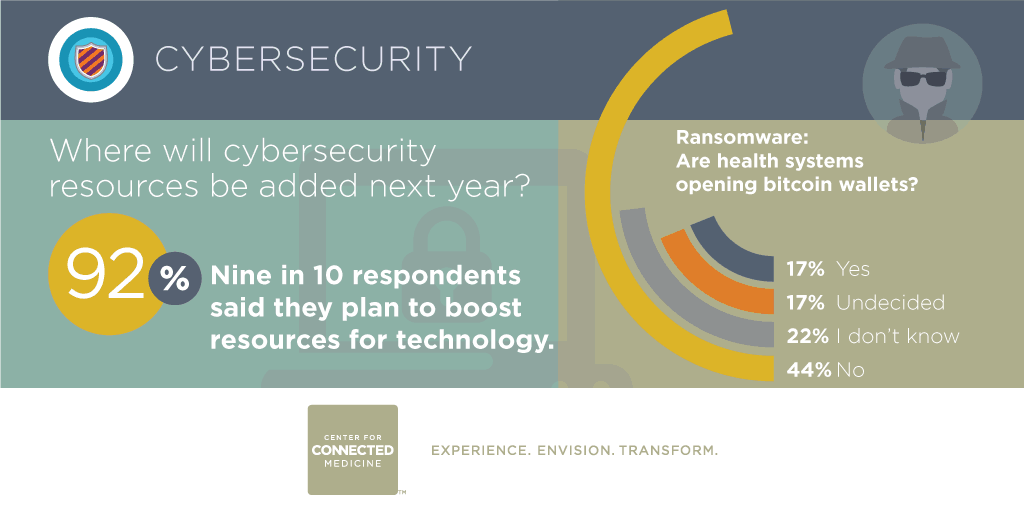
- CONSUMER-FACING TECHNOLOGY: Less than a quarter of respondents expect wearables (17 percent) or mobile health apps (21 percent) to be sources of valuable patient-generated data in 2018. However, executives said they are planning for patient-generated data to make up a larger portion of a patient’s health record in the future.
![]()
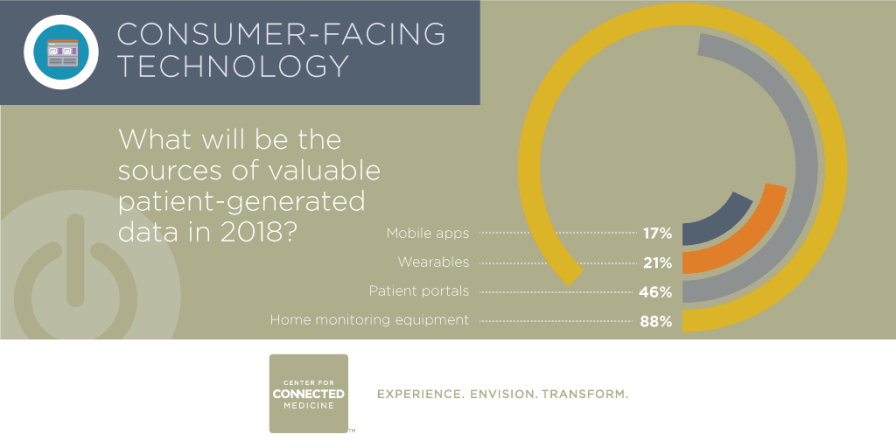
- PREDICTIVE ANALYTICS: More than half of respondents are using or plan to begin using genomic testing as part of providing personalized medicine to patients. Those efforts are focused on oncology, anesthesia and pharmacogenetics.
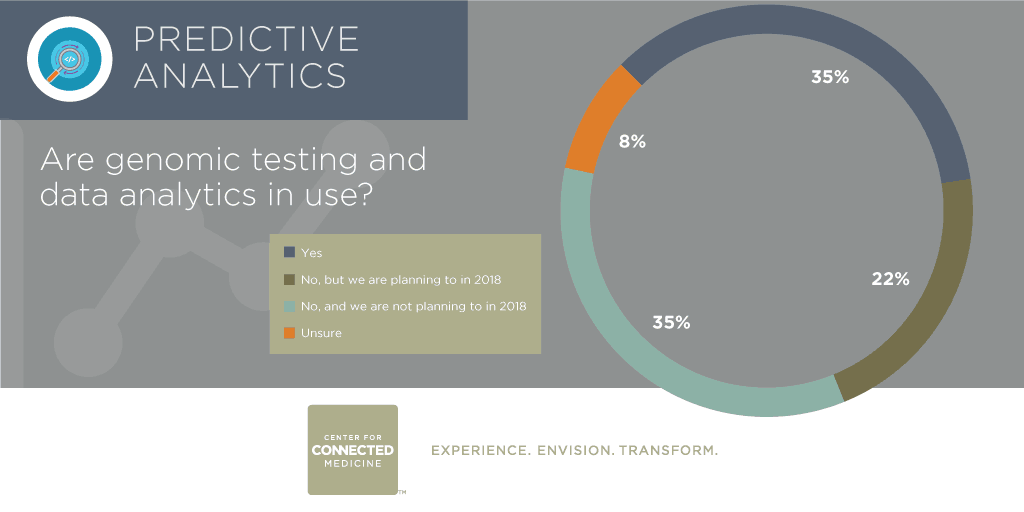
- VIRTUAL CARE: Less than half of respondents receive reimbursement for virtual care (39 percent), or remote monitoring (45 percent). But of the respondents not receiving reimbursement, 71 percent expect to be reimbursed for virtual care in 2018.
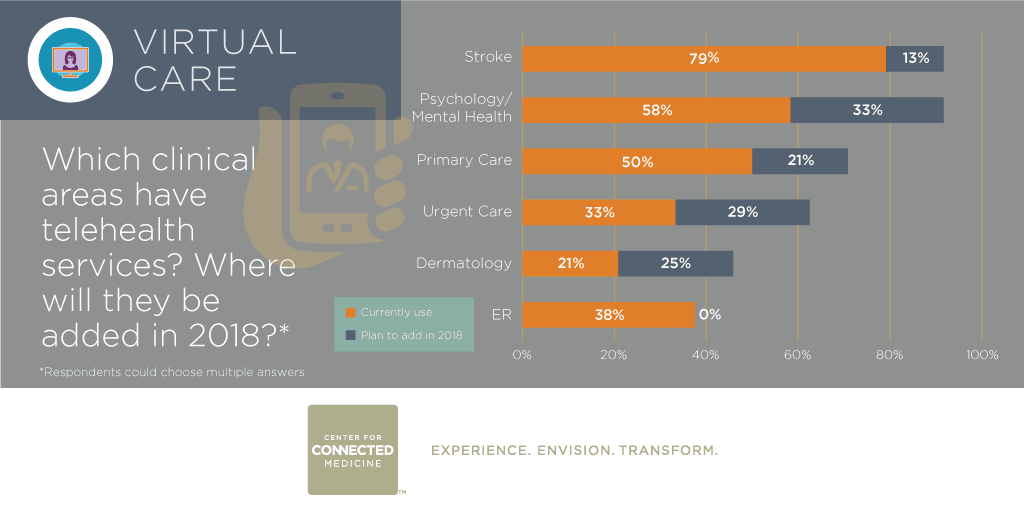
- ARTIFICIAL INTELLIGENCE: Compared with other IT priorities for 2018, implementation of A.I. solutions are a low or very low priority at nearly two-thirds of responding health systems. Executives reported that A.I. is in its early stages where proving its value is difficult, but they expect the technology to have greater impact in the future.
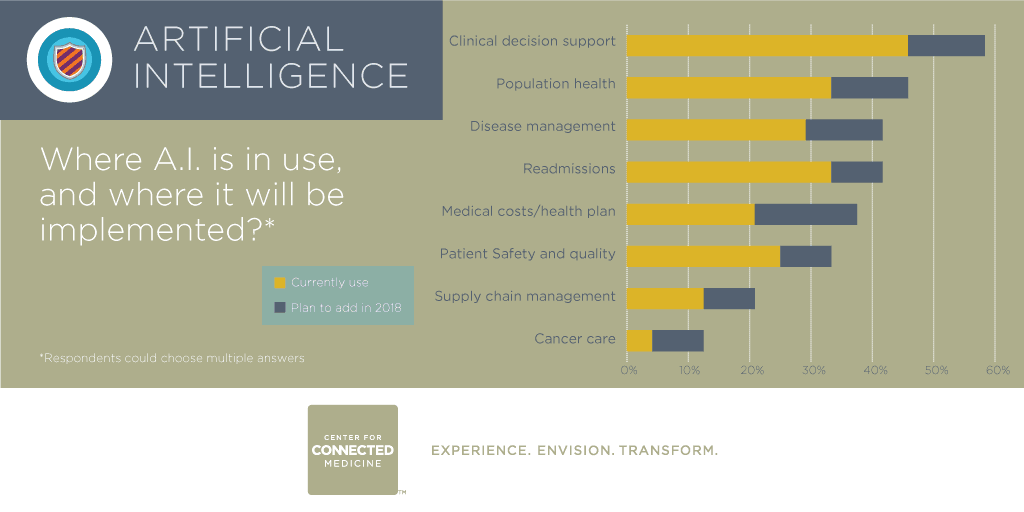
The CCM partnered with The Academy for the Top of Mind 2018 survey of health system executives. The quantitative survey, conducted July 28-Sept. 10, 2017, targeted 35 of the largest health systems in the United States and generated a response rate of 69 percent. Respondents to the quantitative survey were chief informatics officers, chief medical informatics officers or chief nursing informatics officers representing health systems with average net patient revenue of $4.9 billion a year. The Academy also conducted qualitative interviews with 18 chief executive officers, chief financial officers or chief informatics officers of major U.S. health systems from September to November 2017.
Since opening in 2009, the Center for Connected Medicine – an executive briefing center jointly operated by GE Healthcare, IBM, Lenovo Health, Nokia and UPMC – has hosted more than 45,000 visitors from 64 countries. The Academy, based in Alexandria, Va., provides educational programming, research, and analysis for its membership of executives in health care.
Download a copy of the report and view related content at www.connectedmed.com/TopofMind2018
About the CCM
The Center for Connected Medicine is the world’s first collaborative health care executive briefing center, supporting stakeholders in defining the transformation of health care. It serves as a resource for innovative patient-centered and population health models, showcasing strategically integrated health information technology. By facilitating connections among those who deliver, receive, and support health care, the CCM helps promote cultural change, coordinated care delivery, and greater patient engagement. Located in Pittsburgh, Pa., the CCM is operated by five partners — GE Healthcare, IBM, Lenovo Health, Nokia, and UPMC — representing various facets of the health information community. Learn more at www.connectedmed.com.
About the Academy
The Health Management Academy (The Academy) is a membership organization exclusively for executives from the country’s Top-100 Health Systems and most innovative healthcare companies. The Academy’s learning model identifies top priorities of health system leaders; develops rich content based on those priorities; and addresses them by convening members to exchange ideas, best practices, and information. The Academy is the definitive trusted source for peer-to-peer learning in healthcare delivery with a material record of research and policy analysis. Offerings include C-suite executive peer forums, issues-based collaboratives, leadership development programs, research, advisory, and media services. The Academy is an accredited CE provider. More information is available at www.academynet.com.
Throughout the year, our writers feature fresh, in-depth, and relevant information for our audience of 40,000+ healthcare leaders and professionals. As a healthcare business publication, we cover and cherish our relationship with the entire health care industry including administrators, nurses, physicians, physical therapists, pharmacists, and more. We cover a broad spectrum from hospitals to medical offices to outpatient services to eye surgery centers to university settings. We focus on rehabilitation, nursing homes, home care, hospice as well as men’s health, women’s heath, and pediatrics.








